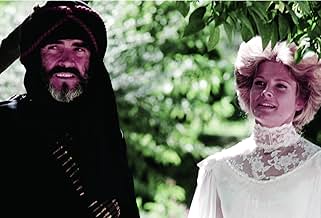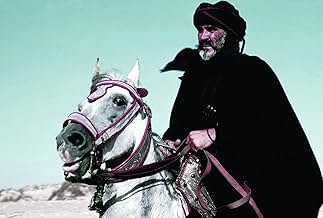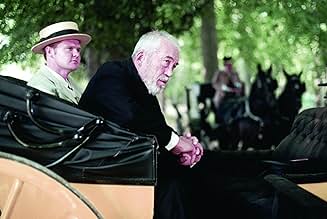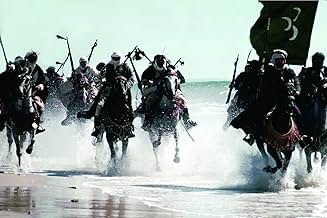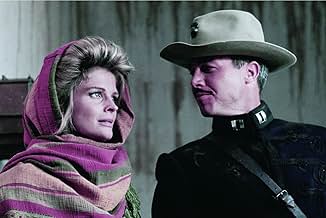CALIFICACIÓN DE IMDb
6.8/10
11 k
TU CALIFICACIÓN
Un líder Árabe crea un incidente internacional al secuestrar a una viuda estadounidense y a sus hijos.Un líder Árabe crea un incidente internacional al secuestrar a una viuda estadounidense y a sus hijos.Un líder Árabe crea un incidente internacional al secuestrar a una viuda estadounidense y a sus hijos.
- Dirección
- Guionista
- Elenco
- Nominado a 2 premios Óscar
- 6 nominaciones en total
Antoine Saint-John
- Von Roerkel
- (as Antoine St. John)
- Dirección
- Guionista
- Todo el elenco y el equipo
- Producción, taquilla y más en IMDbPro
Opiniones destacadas
Lovely Candace Bergen as the widow Perdicaris are kidnapped and held for ransom by the Sheik Raisuli played by one dashing Sean Connery. The incident comes during 1904 as Theodore Roosevelt runs for election to the presidency in his own right. Needing a good example to show off the muscular foreign policy of the United States, Brian Keith as Roosevelt issues a stunning declaration to the Sultan of Morocco, "Perdicaris alive or Raisuli dead."
But in this adaptation of that incident the famous declaration is the only true thing about this story. The Perdicaris in question was in reality one Ion Perdicaris who was a Greek immigrant and dilettante playboy. In fact Perdicaris gave up his American citizenship years ago and was back as a Greek national. Never mind that though, his predicament was serviceable enough at the time.
The damsel in distress makes better screen material though so it's a widow woman and her two kids that are in harm's way here. Of course as presented here the incident is also used by some of our European powers to get their foothold into Morocco. The intrigues get far beyond one brigand's demand for ransom.
The Wind and the Lion is hardly history. But it is an enjoyable film and Sean Connery is always fun to watch. Brian Keith also fits my conception of Theodore Roosevelt and the scenes in the Roosevelt White House do ring true to all the stories told. John Huston plays the ever patient Secretary of State John Hay who Roosevelt had inherited from his predecessor William McKinley.
But kids don't use this film to skip reading a history assignment on the Theodore Roosevelt era.
But in this adaptation of that incident the famous declaration is the only true thing about this story. The Perdicaris in question was in reality one Ion Perdicaris who was a Greek immigrant and dilettante playboy. In fact Perdicaris gave up his American citizenship years ago and was back as a Greek national. Never mind that though, his predicament was serviceable enough at the time.
The damsel in distress makes better screen material though so it's a widow woman and her two kids that are in harm's way here. Of course as presented here the incident is also used by some of our European powers to get their foothold into Morocco. The intrigues get far beyond one brigand's demand for ransom.
The Wind and the Lion is hardly history. But it is an enjoyable film and Sean Connery is always fun to watch. Brian Keith also fits my conception of Theodore Roosevelt and the scenes in the Roosevelt White House do ring true to all the stories told. John Huston plays the ever patient Secretary of State John Hay who Roosevelt had inherited from his predecessor William McKinley.
But kids don't use this film to skip reading a history assignment on the Theodore Roosevelt era.
We usually think of the British as the experts at rendering great adventure from the Imperial age, with the likes of The Four Feathers (1939) and Zulu, simply because the Imperial age was, for the most part, British. Here, in The Wind and the Lion, we see a wonderful rendering of America's own Imperial age.
America's projection of power under Teddy Roosevelt is the backdrop for this conventional tale of the kidnapped damsel who, despite her gentility, is smitten by the rough, manly nobility of her captor, who in turn is disarmed by her beauty and scorn. (Politically correct prigs eager to see some slight of "native" peoples or cultures can rest assured, that the way Arabs and Muslims are depicted here is far more flattering than the way their modern counterparts depict themselves on the current world stage.) What makes this story different are the terrific production values - faultless photography, composition and editing - the terrific casting - the underappreciated Brian Keith playing a bully Teddy - and vivid history.
Though The Wind and the Lion is told largely through the eyes of the son, every member of the family can identify with one of the characters, whether it be Sean Connery's noble brigand, Candace Bergen's feisty heroine, John Huston's wily John Hay or Steve Kanaly's spiffy, radiant, ruthless can-do lieutenant, Roosevelt's "Big Stick". There is a transcendent scene at the end, when the little boy is symbolically swept away by the dashing Moor on his white steed. This is high adventure at its best.
America's projection of power under Teddy Roosevelt is the backdrop for this conventional tale of the kidnapped damsel who, despite her gentility, is smitten by the rough, manly nobility of her captor, who in turn is disarmed by her beauty and scorn. (Politically correct prigs eager to see some slight of "native" peoples or cultures can rest assured, that the way Arabs and Muslims are depicted here is far more flattering than the way their modern counterparts depict themselves on the current world stage.) What makes this story different are the terrific production values - faultless photography, composition and editing - the terrific casting - the underappreciated Brian Keith playing a bully Teddy - and vivid history.
Though The Wind and the Lion is told largely through the eyes of the son, every member of the family can identify with one of the characters, whether it be Sean Connery's noble brigand, Candace Bergen's feisty heroine, John Huston's wily John Hay or Steve Kanaly's spiffy, radiant, ruthless can-do lieutenant, Roosevelt's "Big Stick". There is a transcendent scene at the end, when the little boy is symbolically swept away by the dashing Moor on his white steed. This is high adventure at its best.
After reviewing others' comments I have to say that I agree with most of them, even to some degree with some of the seemingly disparaging ones. In that regard, however, I would have to say to those disappointed with the film because of the considerable liberties it takes with the historical facts that they should bear in mind that this film is clearly intended as a pure adventure story with only enough depth to get the audience emotionally involved (which may explain its undercurrent of political satire so suggestive of the immediate post-Vietnam era in which it was made and released), and could never have been intended as a theatrical representation of historical fact. I'm inclined to doubt you can do both successfully in the same film, at least not without losing a lot of the breezy, lighthearted simplicity that makes the adventure movie what it is in the first place. I think adventure movies deliberately ignore deeper issues raised by the events they treat that could be expected to lead to emotional conflict in the minds of the audience. Thus, in the typical adventure movie there are well-defined good guys and bad guys and motivations and justifications are crystal-clear. On the other hand, real history is full of ambiguities and complexities which raise deeper issues and conflicting feelings in the audience's consciousness, leading to an essentially heavier, more deeply dramatic treatment. Thus, if the producer had tried to make the plot of this film completely accurate he would have wound up with more of a drama than an adventure film, and you would have had a completely different kind of movie all together. Consequently, criticizing this film for not dealing with the deeper issues behind the Morocco crisis of 1904 is like criticizing *Raiders of the Lost Ark* for not treating the evils of Nazism more seriously than it did. *The Wind & the Lion* is like *Raiders*, not *Schindler's List*.
Moreover, even apart from the numerous variances from actual history found in the plot (they even moved the date of the event several months to bring it closer to the presidential election), I have to wonder how accurately it portrays Berber culture or even Theodore Roosevelt (whose portrait hangs on the wall directly above my computer monitor while I write this and about and even by whom I have many books including a complete set of his papers, as edited), however entertaining and appealing they may appear in the film. Nevertheless, because of their interesting and sympathetic treatment, this remains one of my favorite movies. So, if these matters still trouble you when you watch the movie, do what I find comes more or less automatically to me and try thinking of it as basically pure fiction and you should like it just fine.
Having said that, though, one of the best things about this film is that irrespective of what the writers or director did with it to make a lighthearted adventure story, other departments seemingly spared no pains in making it every bit as believable, if not actually accurate, as possible. First, I would bet money that the extras in the scene where the Marines land and storm the palace were real Unites States Marines specifically recruited for the part - note the haircuts, the prolonged double-timing in heavy uniforms, the fact that everybody stays in step, the shouted close-order drill commands, and just their general bearing or attitude (if you've ever spent time with Marines or seen one of their little public relations demonstrations at a Marine Corps base you'll know what I mean). Second, Steve Kanally got into his part in a serious way, portraying a practically flawless Marine Corps "recruiting poster" company commander - this is exactly the way the Marine Corps wants its people to come across when they are showing off for the public. Third, in the scene in the U.S. consul's office Steve Kanally historically accurately relates that he has "two 'reinforced' rifle companies" with which to seize the palace, and his statement is realized in deed when the Marines land on the wharf, as well as when they finally reach the palace, because you will see that not only are Marines present but also U.S. Navy sailors backing them up - i.e., two rifle companies reinforced with sailors from whatever ships that landed them.
Such leads me to the detail that is my favorite because it is so subtle that it is hard to imagine much more than literally a handful of viewers among the thousands who would see this film ever being likely to appreciate it. In the book *American Naval History - An Illustrated Chronology* (published some years after the film was made) naval historian Jack Sweetman relates that in the actual event the Marines were landed from the cruiser USS BROOKLYN. When you see the Marines landing in the film you will note a very antique-looking steamship looming prominently in the background. This is obviously a matte painting inserted using special effects techniques because probably the only ship still existing in the world that looks anything like that is a stationary floating museum, the cruiser USS OLYMPIA of Spanish-American War fame, and it would not be available unless the producer was willing to shoot that scene in downtown Philadelphia. More to the point, consideration of the depiction by anyone with a relevant photograph or two and basic sensitization to ship identification issues reveals that the ship pictured isn't the OLYMPIA. There are not many books easy to find these days that would help you identify the ship (I know of only two), but if you were to make the effort you would be rewarded with an unmistakable solution. The raised fo'c's'l', three very tall stacks, turret locations, and sweep of the stern unambiguously identify this vessel as just one ship and one ship only, and by now I shouldn't have to tell you its name, but of course it is the BROOKLYN. My hat's still off to the Art Department for taking that much trouble to get something so easy to disregard so right.
Anyway, this film which has just about everything this writer could want in an adventure movie: not only Theodore Roosevelt and a lot of Marines at their most virile kick-butt best, but expansive Americanism at its optimistic best ("we have men who can do anything - we have men who can FLY"), Sean Connery as a highly appealing charismatic leader (who at one point very plausibly takes out about ten scum-bucket thug types with aplomb John Wayne could envy), a long cavalry sequence with seemingly hundreds of riders culminating in a good old-fashioned saber charge, a "kid" angle (which reminds you how to look at this thing, if you ask me), a certain amount of witty repartee, healthy doses of chivalry throughout, a romantic aspect that is not wholly gratuitous, and not the least, a very feminine and attractive heroine with enough Yankee grit and determination to satisfy Katharine Hepburn. Rent it, buy it, watch it!
Moreover, even apart from the numerous variances from actual history found in the plot (they even moved the date of the event several months to bring it closer to the presidential election), I have to wonder how accurately it portrays Berber culture or even Theodore Roosevelt (whose portrait hangs on the wall directly above my computer monitor while I write this and about and even by whom I have many books including a complete set of his papers, as edited), however entertaining and appealing they may appear in the film. Nevertheless, because of their interesting and sympathetic treatment, this remains one of my favorite movies. So, if these matters still trouble you when you watch the movie, do what I find comes more or less automatically to me and try thinking of it as basically pure fiction and you should like it just fine.
Having said that, though, one of the best things about this film is that irrespective of what the writers or director did with it to make a lighthearted adventure story, other departments seemingly spared no pains in making it every bit as believable, if not actually accurate, as possible. First, I would bet money that the extras in the scene where the Marines land and storm the palace were real Unites States Marines specifically recruited for the part - note the haircuts, the prolonged double-timing in heavy uniforms, the fact that everybody stays in step, the shouted close-order drill commands, and just their general bearing or attitude (if you've ever spent time with Marines or seen one of their little public relations demonstrations at a Marine Corps base you'll know what I mean). Second, Steve Kanally got into his part in a serious way, portraying a practically flawless Marine Corps "recruiting poster" company commander - this is exactly the way the Marine Corps wants its people to come across when they are showing off for the public. Third, in the scene in the U.S. consul's office Steve Kanally historically accurately relates that he has "two 'reinforced' rifle companies" with which to seize the palace, and his statement is realized in deed when the Marines land on the wharf, as well as when they finally reach the palace, because you will see that not only are Marines present but also U.S. Navy sailors backing them up - i.e., two rifle companies reinforced with sailors from whatever ships that landed them.
Such leads me to the detail that is my favorite because it is so subtle that it is hard to imagine much more than literally a handful of viewers among the thousands who would see this film ever being likely to appreciate it. In the book *American Naval History - An Illustrated Chronology* (published some years after the film was made) naval historian Jack Sweetman relates that in the actual event the Marines were landed from the cruiser USS BROOKLYN. When you see the Marines landing in the film you will note a very antique-looking steamship looming prominently in the background. This is obviously a matte painting inserted using special effects techniques because probably the only ship still existing in the world that looks anything like that is a stationary floating museum, the cruiser USS OLYMPIA of Spanish-American War fame, and it would not be available unless the producer was willing to shoot that scene in downtown Philadelphia. More to the point, consideration of the depiction by anyone with a relevant photograph or two and basic sensitization to ship identification issues reveals that the ship pictured isn't the OLYMPIA. There are not many books easy to find these days that would help you identify the ship (I know of only two), but if you were to make the effort you would be rewarded with an unmistakable solution. The raised fo'c's'l', three very tall stacks, turret locations, and sweep of the stern unambiguously identify this vessel as just one ship and one ship only, and by now I shouldn't have to tell you its name, but of course it is the BROOKLYN. My hat's still off to the Art Department for taking that much trouble to get something so easy to disregard so right.
Anyway, this film which has just about everything this writer could want in an adventure movie: not only Theodore Roosevelt and a lot of Marines at their most virile kick-butt best, but expansive Americanism at its optimistic best ("we have men who can do anything - we have men who can FLY"), Sean Connery as a highly appealing charismatic leader (who at one point very plausibly takes out about ten scum-bucket thug types with aplomb John Wayne could envy), a long cavalry sequence with seemingly hundreds of riders culminating in a good old-fashioned saber charge, a "kid" angle (which reminds you how to look at this thing, if you ask me), a certain amount of witty repartee, healthy doses of chivalry throughout, a romantic aspect that is not wholly gratuitous, and not the least, a very feminine and attractive heroine with enough Yankee grit and determination to satisfy Katharine Hepburn. Rent it, buy it, watch it!
... Except that the Eden Pedecaris character was in reality a man who didn't have any children with him and that the battle at the end with the United States Marine Corp defeating a German force never happened . So in truth it's not actually a true story plot wise
It's very arrogant of Hollywood in general and John Milius in particular to re-write history in this manner because the film is rather accurate in some other ways namely the portrayal of Theodore Roosevelt . Want to know about how the teddy bear came into being ? Watch this film . Roosevelt was a great lover of nature , he was both a hunter and an ecologist and decided that if America wanted to be a major world power then the nation would have to carry a big stick while speaking in a soft voice
Roosevelt more than any president in history made America the superpower it is today and it's a very topical film to watch in 2004 . America's resentment of Germany and France ! Arabs slaughtering infidels on the battlefield but taking a moral high ground about women and children being held as hostage ! American military leaders and diplomats not really caring if they start a bloody war ! The more things change the more they stay the same
It is interesting to see that Milius has painted the Arabs with very human faces . Mulay might be a brigand but he's a most likable anti hero and a cinema audience has the rare opportunity of seeing what Sean Connery is capable of when he's given a good role . I wonder though how this film would have the Arabs if it'd have been made a few years later after the Iranian revolution ? I've got a feeling it would never have been made at all in todays current climate
As it stands THE WIND AND THE LION is very poor history in most parts , fairly good history in some parts and stands as a sort of timepiece when Hollywood was far less xenophobic than it is today
It's very arrogant of Hollywood in general and John Milius in particular to re-write history in this manner because the film is rather accurate in some other ways namely the portrayal of Theodore Roosevelt . Want to know about how the teddy bear came into being ? Watch this film . Roosevelt was a great lover of nature , he was both a hunter and an ecologist and decided that if America wanted to be a major world power then the nation would have to carry a big stick while speaking in a soft voice
Roosevelt more than any president in history made America the superpower it is today and it's a very topical film to watch in 2004 . America's resentment of Germany and France ! Arabs slaughtering infidels on the battlefield but taking a moral high ground about women and children being held as hostage ! American military leaders and diplomats not really caring if they start a bloody war ! The more things change the more they stay the same
It is interesting to see that Milius has painted the Arabs with very human faces . Mulay might be a brigand but he's a most likable anti hero and a cinema audience has the rare opportunity of seeing what Sean Connery is capable of when he's given a good role . I wonder though how this film would have the Arabs if it'd have been made a few years later after the Iranian revolution ? I've got a feeling it would never have been made at all in todays current climate
As it stands THE WIND AND THE LION is very poor history in most parts , fairly good history in some parts and stands as a sort of timepiece when Hollywood was far less xenophobic than it is today
There was something unnerving about watching "The Wind and the Lion". I'm not just speaking of the exceeding suspension of disbelief that had to be cast in its direction, but current events in regard to the film. I must assume that the film, though focussed around the year 1904, must have been written allegorically, because (much like present world events) Sean Connery plays a shiek, speaking frequently of a jihad, and Brian Keith plays Teddy Rosevelt as an embellishment of a power hungry politician. Candice Bergen's character sits in the middle as the occasional "something of value" that the two sort of toy over. It's really an interesting movie, even if a bit full of itself. The weird thing is that when it's not playing out like an adventure or romance (which really seemed contrived), it seems rather humorous in an exaggerated manner, so my guess is that buried underneath all of the thrills is a biting satire of ... well, something. It's an above average film, but still a damn unique one.
¿Sabías que…?
- TriviaThe story was based on a historical incident involving the kidnapping of Ion Perdicaris, an American expatriate living in Tangier (changed to a woman for the movie). However, the two children, the American attack on the Bashaw's palace in Tangier, and the climactic battle between the American and German forces, were all inventions of writer and director John Milius.
- ErroresThe Raisouli and his followers pray while the muezzin is calling. In fact, the actual praying is done after the muezzin finishes - it's his job to remind the faithful to go pray. This is a common mistake in Hollywood productions, possibly done for dramatic purposes.
- Citas
Raisuli: To Theodore Roosevelt - you are like the Wind and I like the Lion. You form the Tempest. The sand stings my eyes and the Ground is parched. I roar in defiance but you do not hear. But between us there is a difference. I, like the lion, must remain in my place. While you like the wind will never know yours. - Mulay Hamid El Raisuli, Lord of the Riff, Sultan to the Berbers, Last of the Barbary Pirates.
- Créditos curiososOpening credits prologue: Tangier October 15, 1904 1:00 pm
- ConexionesFeatured in The Lion Roars Again (1975)
- Bandas sonorasFor He's A Jolly Good Fellow
(uncredited)
Traditional
Sung at Roosevelt's birthday party
Selecciones populares
Inicia sesión para calificar y agrega a la lista de videos para obtener recomendaciones personalizadas
- How long is The Wind and the Lion?Con tecnología de Alexa
Detalles
- Fecha de lanzamiento
- País de origen
- Idiomas
- También se conoce como
- John Milius' The Wind and the Lion
- Locaciones de filmación
- Productoras
- Ver más créditos de la compañía en IMDbPro
Taquilla
- Presupuesto
- USD 4,000,000 (estimado)
- Tiempo de ejecución1 hora 59 minutos
- Color
- Relación de aspecto
- 2.35 : 1
Contribuir a esta página
Sugiere una edición o agrega el contenido que falta

Principales brechas de datos
What is the French language plot outline for The Wind and the Lion (1975)?
Responda

